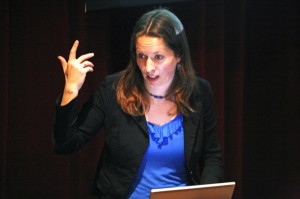Despite the cold weather, the Big Energy Seminar drew a crowd that eagerly listened to speakers presenting information on the state of energy production and consumption in the United States.
The seminar, sponsored by the Renewable and Sustainable Energy Institute (RASEI), featured two speakers, Dr. Jennie Stephens of Clark University who spoke in Old Main from 12- 1:30 p.m., and Dr. David Rutledge of Caltech who spoke in the Engineering Center from 3:30-4:30 p.m on Tuesday.

Jennie C. Stephens of Clark University discusses carbon capture and storage during one of Tuesday's "Big Energy Seminar Series" in Old Main. (CU Independent/James Bradbury)
Stephens spoke on the “Diminishing Hype of so-called ‘Clean Coal’: Carbon, Capture, and Storage in the U.S. Context,” and Rutledge’s topic was: “Energy Supplies and Climate.”
Rutledge’s lecture attempted to show that government estimates of the production of coal, oil and gas are too high for the long run, and that an accurate measure of these substances would be helpful when discussing policy in relation to alternative fuels and climate change.
Rutledge said that his area of expertise, fossil fuel supply, doesn’t include physics as a scientific base for its understanding, and therefore one had to be careful when making rules for this new type of discipline.
“Since it [research in fossil fuel supplies] doesn’t include physics, you have to be careful when choosing rules, you can’t just say, ‘well I like this,’” Rutledge said.
Rutledge made it clear to the audience that he was purely a source of information, and what was done with his information was not his concern.
“My job isn’t to tell people what to think, it is to get them thinking, and it all comes down to them and what they decide to do with the information,” Rutledge said, “That is when things like party affiliation get in the way, I am just here to convey the information.”
Dr. Zoya Popovic, distinguished professor at CU, said that Rutledge’s lecture brought intriguing responses from the crowd, because fossil fuel supply is a hot topic.
“Every time he gives this lecture, he gets interesting responses from the public that are doing work in fields related to his,” Popovic said.
Rutledge’s lecture brought in a large crowd of all ages from the scientific community. Rutledge said that college-age students, although they work with members of an older generation, would be the ones to ultimately make the choices in regards to future energy policy.
“Young people will be the ones to solve [problems in energy],” Rutledge said. “You and the previous generation will come to different conclusions, but in the end it is you that will make the decisions.”
Contact CU Independent Staff Writer Bethany Morris at Bethany.morris@colorado.edu
